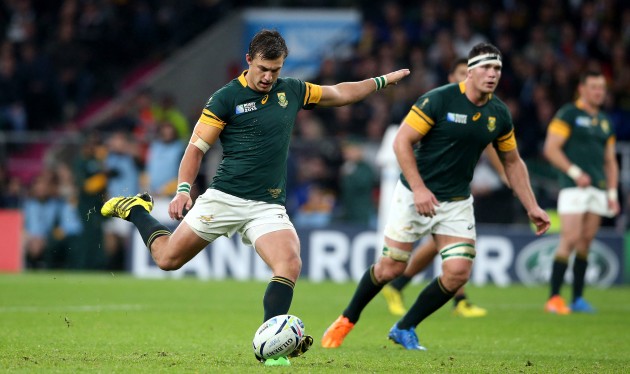Our letter from South Africa details problems at No 10, Eben Etzebeth moving into the boardroom and the EP Kings facing a winding-up order
Pollard and Lambie culled
The Springboks’ first and second choice fly-halves – Handré Pollard and Pat Lambie – both sustained serious injuries just two weeks before the opening matches of Super Rugby 2016. Pollard will miss the entire tournament after rupturing knee ligaments while passing a ball. There was not another player within five metres of him. Initial diagnosis put him out of the game for nine months. Lambie suffered a shoulder injury in the Sharks’ warm-up game against Toulon. The franchise skipper will miss six to eight weeks. The Pollard incident has raised debate about player fatigue and overuse injuries. Pollard went straight from the World Cup to play club rugby in Japan after a full season at club and country level in SA in 2015. Pollard was already nursing a shoulder injury sustained in Japan at the time of his knee injury. Bok centre Damian de Allende will also miss the opening weeks of the tournament after he picked up a serious ankle injury playing club rugby Japan.

Experience: Lambie will be a big loss to the Sharks in Super Rugby
SARU boss still under a cloud
SARU’s chief executive Jurie Roux came under further pressure in the past month. The publication of a report by auditing firm KPMG has implicated him in the misuse of the University of Stellenbosch Rugby Club funds when he was its chairperson between 2002-2010.
Among other things the report claims Roux “manipulated” university funds and used software that didn’t leave an “audit trail.” He is facing a civil lawsuit from the university of approximately £1.5m.
Roux has maintained his innocence since the accusations first surfaced soon after he was appointed as SARU CEO in 2010, but the release of KPMG’s initial report has made his position fragile.

Under scrutiny: SARU CEO Jurie Roux is being questioned over financial irregularities
Erasmus edging closer to being interim Bok coach
SARU’s search for a successor to departed Springbok coach Heyneke Meyer is proving difficult considering its strict guidelines. The new man’s main task will be ensuring that SARU’s Strategic Transformation Plan (STP), which aims for 50% black player representation by 2019, is foremost on the coach’s agenda. Former Stormers boss Allister Coetzee was believed to be the frontrunner but sources claim he is unhappy with some of the conditions. If Coetzee continues to be coy, SARU’s Rugby Department general manager Rassie Erasmus is set to fill in on an interim basis – possibly only for the three-Test home series against Ireland in June. Erasmus was a successful provincial coach with the Cheetahs and Western Province before taking on his current role.

Stand in: Rassie Erasmus (left) is inching towards being temporarily in charge of the Springboks
EP Kings face liquidation
The Eastern Province Rugby Union faces a liquidation hearing next month after players, through SARPA, brought the action against the union. EP players’ salaries routinely went unpaid last year and as a result several players decided to take action.
This action has no implications for the preparations or participation of the Southern Kings in Vodacom Super Rugby,” SARU chief executive Jurie Roux said.
“That entity is wholly owned by the South African Rugby Union and the players, coaches and management team will continue with their work as has been planned. They kick off against the Sharks at the Nelson Mandela Bay Stadium on 27 February and that, and the rest of their fixtures, are unaffected.”

Bleak future: the EP Kings face being wound up with financial problems
Etzebeth moves into the boardroom
Bok second row enforcer Eben Etzebeth is not a man associated with the administrative side of the game. The closest he gets to diplomacy on the rugby field, is of the gunboat variety. But last month he was elected as president of the SA Rugby Players Association (SARPA), replacing the similarly blunt Bismarck du Plessis in the role. Player negotiations could be interesting in future with Etzebeth as one of the leaders of the process.

Erm, natural diplomat: Eben Etzebeth is moving into the boardroom
Give him a high nine
The annual Varsity Cup, now in its ninth staging, started in early February and innovation was again at the forefront of the competition’s structure.
This is after all the tournament that trialled a three-point conversion, two referees and a coach’s referral system. This year the organisers have added another layer of attacking incentive by introducing nine and seven-point tries.
A nine-point try is awarded if the move originated inside the attacking team’s own half. If a play starts between the halfway line and the 22-metre line of the defending team then a try will count seven points.
The honour of scoring the first nine-pointer, which will no doubt become a trivia question in sports quizzes across the world in years to come, fell to NWU Pukke (Potchefstroom) fly-half Barend Janse van Rensburg. He started the move in his own half and rounded it off. He admitted afterwards that he wasn’t even aware that his score was worth nine points until he looked up at the scoreboard. Pukke leading 7-0 at the time suddenly led 16-0. Whether the initiative has encouraged more attacking play is debatable as there was only one nine-pointer during the first four matches of the tournament.





